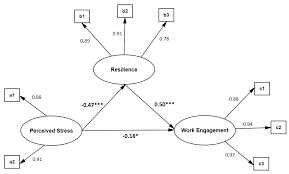
Alzheimer’s disease is a debilitating neurodegenerative disorder that affects millions of individuals worldwide. As the disease progresses, individuals with Alzheimer’s experience a decline in cognitive function, memory loss, and behavioral changes. This can lead to increased stress and decreased resilience in both the affected individuals and their caregivers.
Perceived stress refers to the subjective experience of stress, which can vary from person to person. In the context of Alzheimer’s disease, individuals may perceive stress due to the challenges of daily living, communication difficulties, and the emotional toll of witnessing the decline of a loved one. This perceived stress can have a profound impact on the overall well-being of individuals with Alzheimer’s and their caregivers.
However, research has shown that resilience, the ability to adapt and bounce back from adversity, can play a crucial role in mitigating the negative effects of perceived stress in Alzheimer’s disease. Resilience can be fostered through various factors, such as social support, cognitive stimulation, and engagement in meaningful activities. By building resilience, individuals with Alzheimer’s and their caregivers can better cope with the challenges of the disease and improve their quality of life.
The understanding of the impact of perceived stress and resilience in Alzheimer’s disease is essential for healthcare professionals, caregivers, and researchers. By recognizing and addressing the perceived stress experienced by individuals with Alzheimer’s and their caregivers, interventions can be tailored to improve their well-being and enhance their resilience. This can lead to better outcomes for both the individuals with Alzheimer’s and their caregivers, ultimately improving their overall quality of life.
What is Alzheimer’s Disease?
Alzheimer’s disease is a progressive brain disorder that affects memory, thinking, and behavior. It is the most common cause of dementia, a general term for a decline in cognitive ability severe enough to interfere with daily life.
People with Alzheimer’s disease often experience difficulties with short-term memory, finding words, and performing familiar tasks. As the disease progresses, individuals may also develop changes in their personality and behavior, such as depression, anxiety, and agitation.
While the exact cause of Alzheimer’s disease is still not fully understood, it is believed to involve a combination of genetic, environmental, and lifestyle factors. One theory suggests that the accumulation of abnormal proteins in the brain, called amyloid plaques and tau tangles, may play a role in the development of Alzheimer’s disease.
Perceived stress and resilience can also impact the progression and symptoms of Alzheimer’s disease. High levels of stress have been associated with an increased risk of developing the disease and can worsen cognitive decline. On the other hand, resilience, or the ability to adapt and cope with stress, may help individuals with Alzheimer’s disease maintain their cognitive function and quality of life.
It is important for individuals with Alzheimer’s disease and their caregivers to seek support and resources to manage the challenges of the disease. This may include medical interventions, such as medication and therapy, as well as lifestyle changes, such as regular exercise and a healthy diet.
Definition and Symptoms
Perceived stress refers to an individual’s subjective evaluation of the amount of stress they are experiencing. It is a personal assessment of the stressors in one’s life and the perceived ability to cope with them. In the context of Alzheimer’s disease, perceived stress can be influenced by various factors, including the progression of the disease, caregiver burden, and the individual’s own cognitive decline.
Alzheimer’s disease is a progressive neurodegenerative disease that primarily affects memory and cognitive function. It is the most common form of dementia, accounting for 60-80% of all cases. The disease is characterized by the accumulation of beta-amyloid plaques and tau tangles in the brain, leading to the death of brain cells and the gradual decline of cognitive abilities.
Resilience refers to an individual’s ability to adapt and bounce back from difficult or stressful situations. In the context of Alzheimer’s disease, resilience can play a crucial role in how individuals cope with the challenges posed by the disease. Resilient individuals are better able to maintain a positive outlook, engage in problem-solving, and seek support when needed.
Common symptoms of Alzheimer’s disease include:
- Memory loss: Individuals may have difficulty remembering recent events or information, as well as frequently asking for the same information.
- Confusion and disorientation: Individuals may become easily disoriented, getting lost in familiar places or having difficulty recognizing people.
- Language problems: Individuals may have difficulty finding the right words or following conversations.
- Mood and behavior changes: Individuals may experience changes in mood, such as irritability, anxiety, or depression, as well as changes in behavior, such as social withdrawal or agitation.
- Difficulty performing familiar tasks: Individuals may struggle with tasks they previously had no trouble with, such as cooking or managing finances.
It is important to note that the symptoms of Alzheimer’s disease can vary from person to person and may progress at different rates. Early detection and diagnosis are crucial for managing the disease and providing appropriate support and care.
Prevalence and Risk Factors
Understanding the prevalence and risk factors associated with stress and resilience in Alzheimer’s disease is crucial for developing effective interventions and support systems for individuals affected by the disease.
Alzheimer’s disease is a progressive neurodegenerative disease that affects millions of people worldwide. The stress experienced by individuals with Alzheimer’s disease can be both psychological and physiological in nature. The disease itself can cause cognitive decline, memory loss, and changes in behavior, which can lead to increased stress levels. Additionally, caregivers of individuals with Alzheimer’s disease often experience high levels of stress due to the demands of caregiving.
Research has shown that the prevalence of stress in individuals with Alzheimer’s disease is high, with studies reporting rates as high as 90%. The experience of stress can have a significant impact on the overall well-being and quality of life of individuals with Alzheimer’s disease. It can exacerbate cognitive decline, increase behavioral symptoms, and contribute to a decline in physical health.
Resilience, on the other hand, refers to an individual’s ability to adapt and cope with stress and adversity. Some individuals with Alzheimer’s disease may exhibit higher levels of resilience, which can help buffer the negative effects of stress on their well-being. Research has shown that factors such as social support, engagement in meaningful activities, and a positive attitude can contribute to resilience in individuals with Alzheimer’s disease.
Several risk factors have been identified that can increase the likelihood of experiencing stress and decreased resilience in individuals with Alzheimer’s disease. These risk factors include a lack of social support, caregiver burden, advanced age, and the presence of other chronic health conditions. Understanding these risk factors can help identify individuals who may be at greater risk for stress and develop targeted interventions to support their well-being.
In conclusion, stress and resilience play a significant role in the lives of individuals with Alzheimer’s disease. Understanding the prevalence and risk factors associated with these factors is crucial for developing effective interventions and support systems to improve the overall well-being of individuals affected by the disease.
The Impact of Perceived Stress
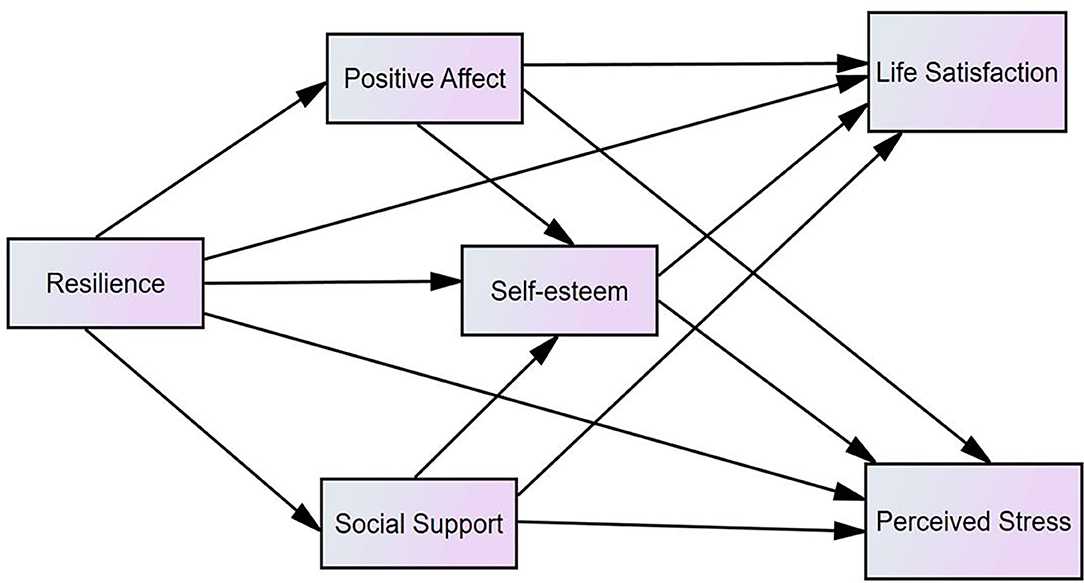
Stress is a common experience in our daily lives, and its impact on our overall well-being cannot be underestimated. When it comes to individuals with Alzheimer’s disease, the effects of stress can be particularly profound. Perceived stress, in particular, plays a significant role in shaping the experiences of individuals with Alzheimer’s disease and their caregivers.
Perceived stress refers to an individual’s subjective assessment of the level of stress they are experiencing. It is influenced by various factors, including personal beliefs, coping mechanisms, and the specific challenges posed by Alzheimer’s disease. Research has shown that individuals with Alzheimer’s disease often experience higher levels of perceived stress compared to those without the disease.
One of the reasons why perceived stress has such a significant impact on individuals with Alzheimer’s disease is its potential to exacerbate cognitive decline. Chronic stress can lead to increased inflammation in the brain, which can accelerate the progression of Alzheimer’s disease and worsen cognitive symptoms. Additionally, stress can impair memory and attention, making it more difficult for individuals with Alzheimer’s disease to perform daily tasks and maintain their independence.
Furthermore, perceived stress can also affect the mental health and well-being of caregivers. Caring for someone with Alzheimer’s disease can be emotionally and physically demanding, and the constant stress can lead to burnout and decreased resilience. This, in turn, can have a negative impact on the quality of care provided to individuals with Alzheimer’s disease.
On the other hand, resilience plays a crucial role in mitigating the impact of perceived stress. Resilience refers to an individual’s ability to adapt and bounce back from stressful situations. It can be cultivated through various strategies, such as social support, exercise, and mindfulness practices. Enhancing resilience in individuals with Alzheimer’s disease and their caregivers can help reduce the negative effects of perceived stress and improve overall well-being.
In conclusion, perceived stress has a significant impact on individuals with Alzheimer’s disease and their caregivers. It can worsen cognitive decline, impair daily functioning, and contribute to caregiver burnout. However, by focusing on enhancing resilience, it is possible to mitigate the negative effects of perceived stress and improve the well-being of individuals with Alzheimer’s disease and their caregivers.
Understanding Perceived Stress
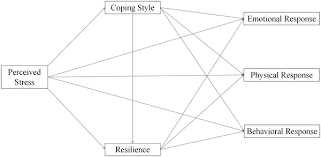
Perceived stress is the subjective experience of stress, where individuals assess and interpret the demands placed on them in relation to their own resources and abilities to cope. It involves the cognitive appraisal of stressors and the emotional response to those stressors. In the context of Alzheimer’s disease, perceived stress refers to the stress experienced by individuals with Alzheimer’s and their caregivers.
Alzheimer’s disease is a progressive neurodegenerative disorder that affects memory, thinking, and behavior. The diagnosis and management of Alzheimer’s can be overwhelming for both individuals with the disease and their caregivers. The cognitive decline and behavioral changes associated with Alzheimer’s can lead to increased stress and burden on caregivers.
Resilience, on the other hand, refers to the ability to adapt and cope with stress and adversity. It is the capacity to bounce back from difficult experiences and maintain well-being. Understanding perceived stress in the context of Alzheimer’s disease is crucial for identifying strategies to enhance resilience and improve the quality of life for individuals with Alzheimer’s and their caregivers.
Perceived stress in Alzheimer’s disease can manifest in various ways, including emotional distress, caregiver burden, and reduced quality of life. Caregivers may experience feelings of sadness, frustration, and helplessness as they witness the decline of their loved ones. They may also face challenges in managing daily activities, financial burdens, and social isolation.
Recognizing and addressing perceived stress in Alzheimer’s disease is essential for promoting resilience and well-being. This can be achieved through various interventions, including support groups, counseling, and education. Caregivers can benefit from learning stress management techniques, developing coping strategies, and seeking social support.
Overall, understanding perceived stress in Alzheimer’s disease is crucial for identifying the needs of individuals with the disease and their caregivers. By addressing and reducing perceived stress, we can enhance resilience and improve the overall well-being of those affected by Alzheimer’s.
Causes and Effects
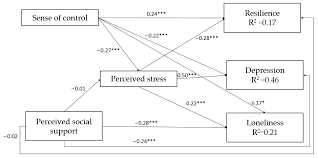
Resilience is an important factor in understanding the impact of perceived stress in Alzheimer’s disease. It refers to an individual’s ability to adapt and cope with adversity, and it plays a crucial role in determining how well a person can manage the challenges associated with the disease.
There are several factors that can contribute to the development of Alzheimer’s disease. One of the main causes is age, as the risk of developing the disease increases with advancing age. Genetic factors also play a role, with certain genes being associated with an increased risk of developing Alzheimer’s disease.
Another significant cause of Alzheimer’s disease is the accumulation of abnormal proteins in the brain, such as beta-amyloid plaques and tau tangles. These protein deposits disrupt the normal functioning of brain cells and lead to the progressive degeneration of cognitive abilities.
The effects of Alzheimer’s disease can be devastating for both the individuals affected and their caregivers. The disease gradually impairs memory, thinking, and behavior, making it increasingly difficult for individuals to perform daily activities and maintain independence. As the disease progresses, individuals may experience confusion, disorientation, and difficulty communicating.
Alzheimer’s disease also has a profound emotional and psychological impact. Individuals with the disease may experience feelings of frustration, sadness, and anxiety as they struggle to cope with the loss of cognitive abilities and the challenges of daily living. Caregivers, on the other hand, often experience high levels of stress and burden as they provide care and support for their loved ones.
In conclusion, understanding the causes and effects of Alzheimer’s disease is crucial for developing effective strategies to manage the disease and support individuals and their caregivers. Resilience plays a key role in how individuals with Alzheimer’s disease cope with the challenges they face, and further research is needed to better understand and enhance resilience in this population.
Measurement and Assessment
The measurement and assessment of resilience in individuals with Alzheimer’s disease is a complex task. Resilience refers to an individual’s ability to adapt and cope with stress and adversity. In the context of Alzheimer’s disease, resilience can be seen as the ability to maintain a positive outlook, engage in meaningful activities, and maintain social connections despite the challenges posed by the disease.
There are several ways to measure and assess resilience in individuals with Alzheimer’s disease. One common method is through self-report questionnaires, where individuals rate their perceived level of resilience on a scale. These questionnaires typically ask about various aspects of resilience, such as emotional well-being, social support, and problem-solving skills.
Another approach is through observational assessments, where trained researchers or clinicians observe and rate an individual’s behavior and responses to stressors. These assessments can provide valuable insights into an individual’s resilience and how they cope with the challenges of Alzheimer’s disease.
It is important to note that measuring resilience in individuals with Alzheimer’s disease can be challenging due to the progressive nature of the disease. As cognitive abilities decline, individuals may have difficulty accurately reporting their own resilience or may exhibit changes in behavior that make it difficult to assess resilience through observation.
Despite these challenges, measuring and assessing resilience in individuals with Alzheimer’s disease is crucial for understanding the impact of the disease on their well-being. By identifying factors that contribute to resilience, healthcare professionals can develop interventions and support strategies to enhance resilience and improve the quality of life for individuals with Alzheimer’s disease.
The Role of Resilience
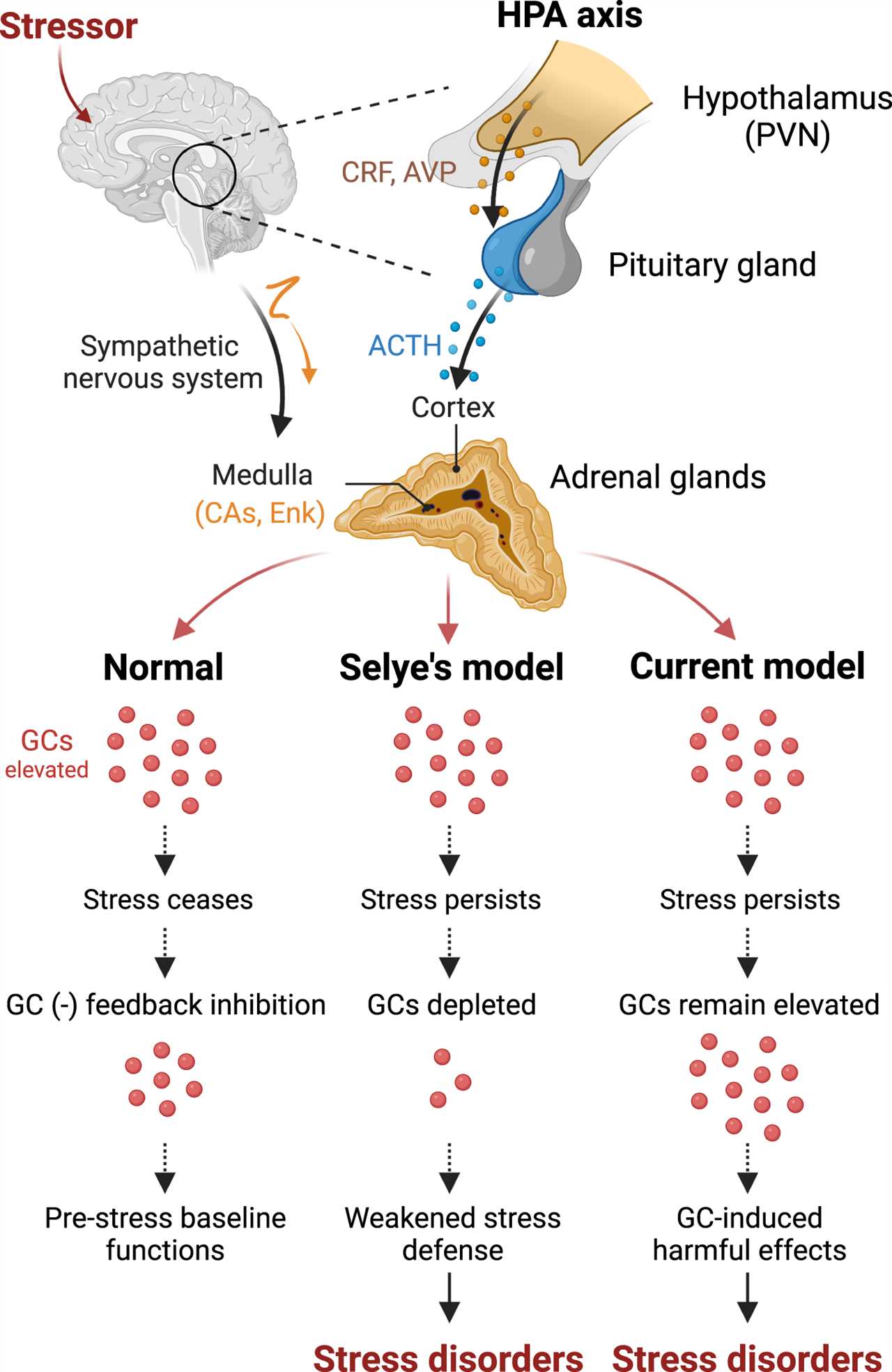
In the context of Alzheimer’s disease, stress is a common experience for both patients and their caregivers. The challenges and uncertainties that come with the disease can lead to high levels of perceived stress, which can have negative effects on mental and physical health.
However, research has shown that resilience plays a crucial role in mitigating the impact of stress in Alzheimer’s disease. Resilience refers to the ability to adapt and bounce back from difficult situations. Individuals with higher levels of resilience are better equipped to cope with the challenges of the disease and maintain their well-being.
Resilience can be fostered through various strategies and interventions. Building a strong support network, engaging in stress-reducing activities such as exercise and mindfulness, and seeking professional help when needed are all important steps in developing resilience.
Furthermore, caregivers play a vital role in supporting the resilience of individuals with Alzheimer’s disease. By providing emotional support, assisting with daily activities, and promoting a sense of purpose and meaning, caregivers can help enhance the resilience of their loved ones.
Overall, the role of resilience in Alzheimer’s disease cannot be overstated. It is a key factor in mitigating the negative effects of stress and promoting well-being for both patients and caregivers. By understanding and harnessing the power of resilience, we can improve the quality of life for those affected by this challenging disease.
Defining Resilience
Resilience refers to an individual’s ability to adapt and bounce back in the face of adversity, including the challenges that come with Alzheimer’s disease. It is the capacity to maintain physical and psychological well-being despite the presence of stressors or difficult circumstances.
In the context of Alzheimer’s disease, resilience can be seen as the ability of individuals with the disease to cope with the cognitive and functional decline, as well as the emotional and psychological stress that comes with the diagnosis. It involves the ability to find meaning and purpose in life, maintain positive relationships, and engage in activities that bring joy and fulfillment.
Resilience is not about denying or ignoring the challenges and stressors associated with Alzheimer’s disease. Instead, it is about acknowledging and accepting the reality of the disease, while also finding ways to adapt and thrive despite its impact. It involves developing effective coping strategies, seeking support from loved ones and healthcare professionals, and making lifestyle changes that promote overall well-being.
Research has shown that resilience can have a positive impact on the quality of life for individuals with Alzheimer’s disease. It can help reduce the negative effects of stress, improve cognitive function, and enhance emotional well-being. By fostering resilience, individuals with Alzheimer’s disease can better manage the challenges they face and maintain a higher level of functioning and independence.
Factors that Contribute to Resilience
Resilience is a key factor in managing the impact of Alzheimer’s disease. It is the ability to adapt and bounce back from the challenges and stressors associated with the disease. Understanding the factors that contribute to resilience can help individuals and their caregivers better cope with the effects of Alzheimer’s.
One factor that contributes to resilience is a strong support system. Having family, friends, and healthcare professionals who can provide emotional support, practical assistance, and guidance can help individuals with Alzheimer’s navigate the challenges they face.
Another factor is maintaining a sense of purpose and meaning in life. Engaging in activities that bring joy and fulfillment, such as hobbies, volunteering, or spending time with loved ones, can help individuals maintain a positive outlook and cope with the stressors of the disease.
Physical health and self-care are also important factors in resilience. Adopting a healthy lifestyle, including regular exercise, nutritious eating, and adequate sleep, can improve overall well-being and help individuals better manage stress and symptoms associated with Alzheimer’s.
Furthermore, having effective coping strategies and problem-solving skills can contribute to resilience. Learning and practicing stress management techniques, such as deep breathing exercises, meditation, or engaging in relaxation activities, can help individuals reduce perceived stress and build resilience.
Lastly, maintaining a positive attitude and mindset can play a significant role in resilience. Focusing on the present moment, practicing gratitude, and cultivating optimism can help individuals with Alzheimer’s maintain a hopeful outlook and approach challenges with resilience.
| Factors that Contribute to Resilience |
|---|
| Strong support system |
| Sense of purpose and meaning in life |
| Physical health and self-care |
| Effective coping strategies and problem-solving skills |
| Positive attitude and mindset |
Building and Maintaining Resilience
Resilience plays a crucial role in managing the impact of stress and Alzheimer’s disease. Alzheimer’s disease is a chronic neurodegenerative disease that affects memory, thinking, and behavior. It can cause significant stress for both individuals with the disease and their caregivers.
Building and maintaining resilience can help individuals with Alzheimer’s disease and their caregivers cope with the challenges and stressors that come with the disease. Resilience refers to the ability to adapt and bounce back from difficult situations, and it can be developed and strengthened over time.
One way to build resilience is by developing a strong support system. This can include family, friends, support groups, and healthcare professionals who can provide emotional support and practical assistance. Having a support system in place can help individuals with Alzheimer’s disease and their caregivers feel less isolated and overwhelmed.
Another important aspect of building resilience is self-care. Taking care of one’s physical and mental well-being is essential for managing stress and maintaining resilience. This can involve engaging in regular exercise, getting enough sleep, eating a balanced diet, and practicing relaxation techniques such as meditation or deep breathing exercises.
Additionally, maintaining a positive mindset can contribute to resilience. Focusing on the strengths and abilities that individuals with Alzheimer’s disease still possess can help them maintain a sense of purpose and self-worth. Encouraging engagement in meaningful activities and hobbies can also contribute to a positive outlook.
Lastly, seeking professional help when needed is crucial for building and maintaining resilience. Healthcare professionals can provide guidance, support, and resources to help individuals with Alzheimer’s disease and their caregivers navigate the challenges they face. Therapy, counseling, and medication can also be beneficial in managing stress and building resilience.
In conclusion, building and maintaining resilience is essential for managing the impact of stress and Alzheimer’s disease. By developing a strong support system, practicing self-care, maintaining a positive mindset, and seeking professional help when needed, individuals with Alzheimer’s disease and their caregivers can better cope with the challenges they face and improve their overall well-being.

I am Patrina de Silva, a psychologist and mental health blogger in Sri Lanka. After obtaining psychology degrees from the University of Colombo and Monash University, I returned home to work as a counselor while also starting the popular blog “Pressy but Happy” to provide advice on psychological issues. Over the past decade, my empathetic articles have made my blog a leading mental health resource in the country. In addition to writing, I maintain a private therapy practice, frequently volunteer counseling time, and conduct seminars, driven by my passion for destigmatizing mental illness and educating the public on the mind-body connection. I strive to be an influential voice in my field through my compassionate approach.
